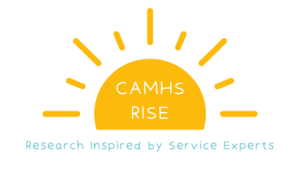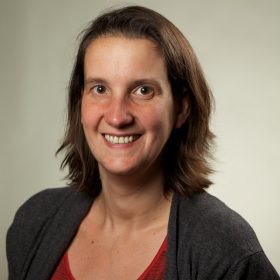 Introduction
Introduction
Child and Adolescent Mental Health Services (CAMHS) Research Inspired by Service Experts (RISE): CAMHS RISE, aims to gather ideas for new research questions from young people with experience of Child and Adolescent Mental Health Services, their parents, and clinicians. These questions will be prioritised by young people and then saved in a database for trainee clinical psychologists and researchers to take forward for future projects.
The project was inspired by a young service user asking whether there was a link between CAMHS waiting times and inpatient admissions; a fantastic example of how research can be user-led. It became clear that there weren’t appropriate systems for service evaluation in place to facilitate this within CAMHS or Research and Development. After some time, a Trainee Clinical Psychologist undertook a literature review and service evaluation. However, the process was slow, and two years later results are only just being shared.
We aim to develop infrastructure whereby questions generated by service users, parents/carers, and staff could be stored and used by clinical trainee psychologists for service evaluation within CAMHS as part of their training. Ideas for larger projects could also be shared with researchers who can develop them into bids for research funding.
Aims
• Generate service development research guided by young service users and their parents/carers
• Create repository of questions submitted by service users, parents/carers and staff
• Questions to be accessed by trainee clinical psychologists at the Universities of Exeter and Plymouth, ChYMe and PenARC researchers and early career researchers in Devon Partnership Trust
• Develop model of info gathering and storage that can be sustained beyond initial bid
Activity
We are gathering ideas from service users and professionals involved in CAMHS to be turned into potential research projects. These are generated in workshops with young people, parents, and a survey for professionals. Young people with experience of CAMHS will prioritise the research questions. These questions will help us to develop new research that is relevant and important to the people who know the service best.
Ideas that are submitted will go into a prioritised repository in CAMHS for trainee clinical psychologists to access when they undertake their service evaluation project as part of their training and for ChYMe researchers to access for development of new projects or areas of research.
We will conduct rapid evidence reviews for the questions that are ranked as most important by young people to produce plain language summaries of what is currently known and any relevant ongoing research. These summaries will be reviewed for accuracy by experts in the field and for accessibility by young people before dissemination. They will provide a way to give something back to the young people who have been involved in this project, as results from any research projects that come from their ideas will take a longer time.
Outputs
The project team have run 3 workshops with CAMHS-experienced young people from across Devon to identify potential service evaluation questions. These were used to create evidence summaries which you can read in the downloads section below.
A repository will be created from which DClinPsych trainees can select service evaluation projects. It is anticipated that these projects could lead to service improvements in the longer term, based on suggestions that come from young service users.
Larger questions may be developed into bids for research funding. Young people who were involved in question generation or prioritisation and expressed an interest in staying informed of future research will be invited to be involved in future work related to their questions.
Next steps
- We will create a repository of questions that trainee clinical psychologists and other researchers can access to develop new research projects.
- Plain language summaries of the evidence for top-ranked questions will be produced and disseminated.
- The methods used in this project will be documented for sustainability of the project in Devon and to be shared with other Trusts who might want to implement the project in their own areas.
Links and downloads
- Devon Partnership NHS Trust
- Children and Family Health Devon
- Project news from Children & Family Health Devon
- Evidence summary questions: What strategies are effective for improving young people’s experiences of transitions between child and adult mental health services?
- What can be done to help young people feel more listened to in the CAMHS referral process?
- Does parental support impact the effectiveness of mental health services for young people?
- What support can be offered to young people while on the waiting list for CAMHS?
- How does having a diagnosis of a neurodiverse condition affect CAMHS practitioners’ decisions about mental health treatment?
- Are ethnic minority children and young people treated differently in CAMHS in terms of the services or treatment they receive?
- Do waiting list times for CAMHS lead to worsening mental health in young people
Collaborators
- Nicola Walker, Devon Partnership NHS Trust
- Becky Watson, Devon Partnership NHS Trust
- Lisa Thorne, Children and Family Health Devon
- Charlotte Marr, Children and Family Health Devon
- Declan Potter, Children and Family Health Devon
PenARC Staff

Dr Rachel Hayes
Senior Research Fellow
Morwenna Rogers
Information Specialist
